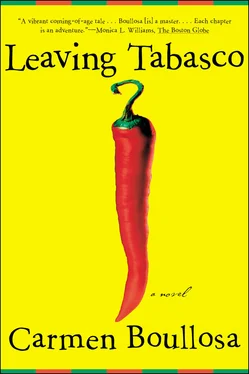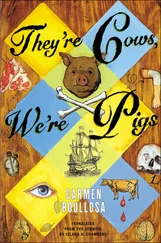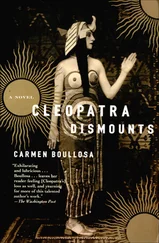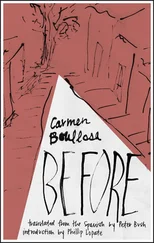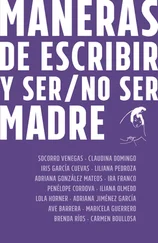Thanks, maybe, to the blessed sign shown us by the saintly old Luz, and to something else that happened during the week but escaped my girlish eyes, the priest was obliged to make a decision. He came to the house to tell us about it that Thursday evening: henceforth he would be spending Sunday in Agustini. Neither the priest nor Mama nor I ever returned to the old routine. The priest opted to break up his Masses over three days; Sunday, he would stay in the parish; Fridays and Saturdays he would come and go, extending the area of his preaching. On Fridays Mama would go with him. For his trips on Saturdays — which was house-cleaning day, so Grandma wouldn’t have let her go — he didn’t even ask for her company. He just said that on that day he’d be traveling alone, off to God knows how many settlements.
On the following Sunday, the tenth of this bizarre set, the God of our town, unfaithful to the tradition that the number seven should be the one for rest, finally relaxed. He allowed our morning routines to resume their usual pattern, as if all He had been waiting for in order to switch off his machinery of raging monstrosities was the decision of the priest not to travel with me on Sundays. Grandma, Mama, and I accepted this decision, without one unsaintly grumble.
Funeral Masses were said for the soul of old Luz, who had spontaneously turned into Doña Luz. At the Indian Mass they filled the nave of the church with flowers, songs, dances, and a fragrant incense, which had not dispersed even by the time the altar boys were setting up the benches for the nine o’clock Mass which we attended, clad, without exception, in lugubrious black. In the vestibule the Indians had left a lovely carpet made of flowers and seeds of various colors. Inside, the nave was full of candles and branches of orange-colored cempasuchil, laid at the foot of the walls and pillars. The lingering perfume also helped to make the ceremony profoundly moving. I spent the mass weeping for my little old lady, remembering her caramels, her hand clapping, her flan, her way of slaughtering hens and turtles, her songs, and the babies howling away feebly. Dulce wept inconsolably, and when the rest of us left, she remained behind on her bench, motionless in her grief.
We left her there to cry to her heart’s content and walked on to the priest’s house. After breakfast, at which the nuns, also dressed in mourning, went back to discussing the embroidery of the tablecloth, with a concentration and energy worthy of a Vatican Council, we seated ourselves on the benches and hammocks in the garden, on the opposite side from the laurels and the flowering shrubs that the nuns fussed over, near where the river slid by. Chatting aimlessly, we watched the water gliding away and the boats of the fishermen bobbing gently. Grandma too sat with us, instead of rushing home as she usually did. She listened to the chatter of the nuns, the priest, Mama, and me without interrupting. She didn’t utter a peep, till suddenly she said, “Well, you see …”
“You have to realize that this territory was once governed by a man who hadn’t been born here but in Cuba, in the days when it was simpler to go to Havana and back than it was to go to Villahermosa. Back then there were no ferryboats to cross the rivers. You had to leave your horse on one side of the River Tancochapan and get another mount on the other side, and the same again at the Mezcalapa, not to mention the Grijalva and the Usumancinta, two vast bodies of water you had to cross to reach the capital, which in those days wasn’t even called Villa-hermosa but St. John the Baptist. I won’t touch on going to Mexico City. It was out of the question, since there weren’t any roads to get there.
“This man, Francisco Sentmanat, married one of the sisters of my grandmother, the eldest one, to be precise. Poor thing, what a life she had to lead! It was a love match, not a marriage of convenience, though by the time they did marry, more than one person assumed it was ambition that was leading her down the aisle, because at that period Sentmanat was the owner of Tabasco. Nobody said no to him; he always had the last word on everything. I think that he had genuine feelings for my aunt Dorita. Otherwise, how can you explain it, eh? He had his pick of so many girls, so why was he going to tie himself to a girl who was less wealthy than he was and who, they say, wasn’t really all that pretty. I don’t say she was ugly, because none of my mother’s sisters was ugly, but Dorita, well, there’s no denying it, she was the least gifted, shall we say, people didn’t rave about her eyes the way they did about Sara’s or about the china-doll complexion my grandmother had, or about the hourglass waist of little Nena …
“Anyway, it turns out that this Sentmanat did just what he pleased till his excesses exhausted everybody’s patience and they threw him out of Tabasco. He was a tyrant, there’s no denying it. I have to admit it, even though we’re related. On the good side he declared the independence of Tabasco, saying that this was what we needed, and why not? But on the bad side, he was a cheap and nasty sort, forever pulling a fast one wherever he could, though where he thought he got the right to do so, I can’t say, but he was full of caprices and ambitions and because of his character he had people assassinated for no real reason or stuck in jail, regardless of who they were. As well, even though he was genuinely fond of Aunt Dorita, he grabbed any woman he fancied, as if all the women in Tabasco were Indians and he could have a tumble with them in a cane field or coffee plantation and never face the consequences. He raised taxes outrageously, transferred other people’s property into his name, whether it was an established farm or not. Oh, his government became intolerable, so bad that even our family, the Ulloas, who were related to him, turned against him. Ages before, the government in Mexico City had declared his position illegal, but what the devil did he care? Back then, they were so far away, as I said. It would have been more to the point if Havana or Mérida had declared war on us, but that didn’t happen. Sentmanat was the close friend of the governor of the Yucatán and did an incredible amount of business with the Cubans and the Spaniards in Cuba. But the upshot was that the Ulloas and the other Tabasco families finally kicked him out, because without help from anybody, he’d earned his expulsion, thanks to all his wild ways and crazy messes there’s no point in even mentioning.
“He went off to live in New Orleans, with my poor aunt Dorita and all. They say he had a very nice house there. In fact they built three like it in St. John the Baptist, one of them belonging to my aunt Nena, Dorita’s sister. Her husband had made it his personal business to get rid of Sentmanat as governor, and it wasn’t as if Aunt Nena’s husband was especially envious or liked to pick a fight, but Sentmanat brought it upon himself. Not content with being the big boss over everything in Tabasco, and with always having the last word in everything, and with being the representative of law and order, he declared the family’s properties solely his own, and, worse still, confiscated land from people who weren’t even related to him, if there was a single rubber tree growing on it. He was friendly with some Germans who had come to collect rubber, when they’d scented there were going to be big profits in it, because back in Europe they were using it to make all sorts of things like combs, shoes, billiard balls, buttons, buckets, electrical insulators, boxes, knife handles, and such. Sentmanat did the arithmetic and figured out there was a fortune in rubber, so he confiscated any property where rubber trees grew.
Читать дальше
